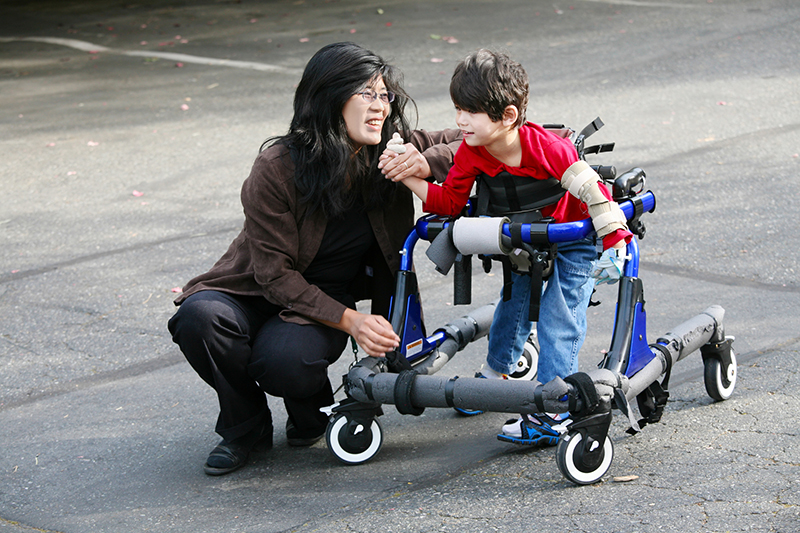Families For Life | Your Feelings About Your Child’s Disability

When your child gets a diagnosis of disability, you might feel emotionally overwhelmed. It won’t always be like this, though, and there are some things you can do to manage your feelings in the meantime.
Your feelings: what to expect
Every parent is different. But after a diagnosis of disability, it’s very common for parents to feel confused and overwhelmed, shocked, disbelieving or numb and worried.
A whole range of feelings is normal.
As you get used to the situation, you might feel sad, especially when thinking about your disappointed hopes and dreams for your child and yourselves. There can be feelings of blame – directed towards yourselves and other people – as well as fear about the future. You might also feel confused and overloaded, with too much information, conflicting advice and pressure to make decisions.
Your feelings can be influenced by how your child’s condition affects other aspects of your lives – it could have an impact on your work, social life or the amount of time you can spend on personal interests or hobbies.
As with any family, the amount of support you have from others, like your spouse, family and friends, also affects how you feel. For example, lots of encouraging support will help you feel more positive about your new role.
When you finally get a diagnosis of your child’s condition, you might even feel relieved, especially if you’ve been worried about your child’s development for a while. A diagnosis often means you can start asking questions and making decisions.
There’s no ‘right’ way to feel. You can’t prevent your feelings, and you shouldn’t try. Dealing with your feelings is part of coming to terms with the diagnosis and moving on with your life, your child’s life and your family’s life.
Tips for coping with your feelings
Most parents and families eventually start to feel OK. They have positive feelings like love, joy, acceptance and satisfaction, and they start making new plans and having new dreams for their child.
These tips might help you manage your feelings as you get used to your situation.
Looking after yourself
Accept your feelings, whatever they are – don’t push them away. Acknowledging your emotions is a healthy thing to do.
Give yourself time. Negative feelings won’t stay forever, but they can come back from time to time – for example, at your child’s birthday, when someone in your extended family has a child, when there’s a family wedding or graduation, or your child starts preschool or school. Over time, you’ll get better at recognising the feelings and dealing with them.
Be kind to yourself. Take care of yourself and keep healthy.
When you’re ready, talk to people close to you, particularly your spouse, about how you’re feeling. Try to accept that other people might have completely different feelings from yours.
Get to know other parents who are in a similar situation. It can help to talk to people who understand what it’s like to have a child with disability.
Enjoying time with your child
Try to avoid comparing your child with other children. Every child is an individual.
Celebrate successes and milestones – yours and your child’s – and focus on positives and progress. Your child might be developing differently from other children but will be reaching her own goals and milestones along the way. There will be lots of reasons to feel positive.
Take time to just enjoy your child without focusing on the disability. With time you’ll get better at doing this.
Seeking help
Collect information about your child’s diagnosis from reliable sources like government, hospital and university websites. Remember that not everything you find on the internet is based on reliable scientific research.
Seek professional support and information. Your General Practitioner (GP) and community-based early childhood intervention services are good places to start.
Different relationships, different feelings
Siblings
The way siblings feel will depend on:
how old they are
how their parents are coping
how parents and others talk about their sibling with disability
how much support they’re getting
whether they understand the disability.
You might like to look at our tips on helping siblings cope.
Grandparents, family members and friends
Extended family and friends will also be affected by the diagnosis, and can experience the same range of feelings as you. Read our tips on how to deal with other people’s reactions to your child’s disability.
Speaking of Children II: Dr Kenneth Poon on Self-Care for Parents of Children with Developmental & Special Needs
As you take care of your child with developmental or special needs, it’s just as important that you and your spouse find the space in your day to practise self-care too! Watch on for some self-care tips from Dr Kenneth Poon.
© raisingchildren.net.au, translated and adapted with permission
Explore more